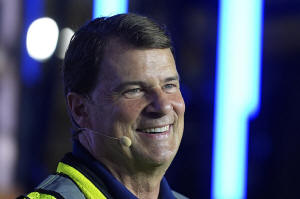Ford hits the pedal on EV production with $2 billion overhaul of
Kentucky plant
[August 12, 2025] By
BRUCE SCHREINER Associated Press
LOUISVILLE, Ky. (AP) — Ford Motor Co. will invest nearly $2 billion
retooling a Kentucky factory to produce electric vehicles that it says
will be more affordable, more profitable to build and will outcompete
rival models.
The automaker’s top executive unveiled the new EV strategy at Ford’s
Louisville Assembly Plant which, after producing gas-powered vehicles
for 70 years, will be converted to manufacture electric vehicles.
“In our careers, as automobile people we’re lucky if we get to work on
one, maybe two, projects that really change the face of our industry,”
CEO Jim Farley told plant workers in Kentucky on Monday. “And I believe
today is going to light the match as one of those projects for all of us
here.”
The Big Detroit automakers have continued to transition from internal
combustion engines to EV technology even as President Donald Trump’s
administration unwinds incentives for automakers to go electric. Trump’s
massive tax and spending law targets EV incentives, including the
imminent removal of a credit that saves buyers up to $7,500 on a new
electric car.
Yet Farley and other top executives in the auto industry say that
electric vehicles are the future and there is no going back.
The first EV to be produced by the revamped Louisville production
process will be a midsize, four-door electric pickup truck in 2027 for
domestic and international markets, the company said Monday.

The new electric trucks will feature plenty of interior space to fit
five adults and pack enough power to have a targeted 0-60 time as fast
as a Mustang EcoBoost but with more downforce, Ford said
The electric trucks will be powered by lower-cost batteries made at a
Ford factory in Michigan. The Detroit automaker previously announced a
$3 billion investment to build the battery factory.
The automaker sees this as a “Model T moment” for its EV business — a
reference to revolutionary changes on the production line led by the
company's founder, Henry Ford, when it began churning out vehicles from
a factory more than a century ago. Farley said the changes will upend
how electric vehicles are made in the U.S.
“It represents the most radical change on how we design and how we build
vehicles at Ford since the Model T,” Farley said.
The company said it will use a universal platform and production system
for its EVs, essentially the underpinning of a vehicle that can be
applied across a wide range of models.
The Louisville factory — one of two Ford assembly plants in Kentucky’s
largest city — will be revamped to cut production costs and make
assembly time faster as it’s prepared to churn out electric vehicles.
The result will be “an affordable electric vehicle that we expect to be
profitable,” Farley said in an interview with The Associated Press ahead
of the announcement. “This is an example of us rejuvenating our U.S.
plants with the most modern manufacturing techniques.”
The new platform enables a lineup of affordable vehicles to be produced
at scale, Ford said. It will reduce parts by 20% versus a typical
vehicle, with 25% fewer fasteners, 40% fewer workstations dock-to-dock
in the plant and a 15% faster assembly time, Ford said.
[to top of second column] |

Ford CEO Jim Farley speaks at the Louisville Assembly Plant, Monday,
Aug. 11, 2025, in Louisville, Ky. (AP Photo/Darron Cummings)
 The traditional assembly line will
be transformed into an “assembly tree” at the Louisville plant, the
company said. Instead of one long conveyor, three subassembly lines
will operate simultaneously and then join together, it said.
Other specifications for the midsize electric truck – including its
reveal date, starting price, EPA-estimated battery range, battery
sizes and charge times — will be announced later, the company said.
Farley revealed that the truck will have a targeted starting price
of about $30,000.
Ford said its investment in the Louisville plant will secure 2,200
hourly jobs.
Kentucky Gov. Andy Beshear said Monday that the automaker’s plans
for the Louisville plant will strengthen a more than century-old
partnership between Ford and the Bluegrass State.
“This announcement not only represents one of the largest
investments on record in our state, it also boosts Kentucky’s
position at the center of EV-related innovation and solidifies
Louisville Assembly Plant as an important part of Ford’s future,”
Beshear said.
Ford said its combined investment of about $5 billion at the
Kentucky assembly plant and Michigan battery plant is expected to
create or secure nearly 4,000 direct jobs between the two plants
while strengthening the domestic supply chain with dozens of new
U.S.-based suppliers.
Ford previously forecast weaker earnings growth for this year and
further losses in its electric vehicles business as it works to
control costs. Model e, Ford’s electric vehicle business, posted a
full-year loss of $5.08 billion for 2024 as revenue fell 35% to $3.9
billion.
Ford’s new EV strategy comes as Chinese automakers are quickly
expanding across the globe, offering relatively affordable electric
vehicles.
“We’re not in a race to build the most electric cars,” Farley told
the AP when asked about competition from China. “We’re in a race to
have a sustainable electric business that’s profitable, that
customers love.

“And this new vehicle built in Louisville, Kentucky, is going to be
a much better solution to anything that anyone can buy from China,”
he added.
Ford could have opted to launch its EV project overseas to reap
lower-cost labor and currency advantages but instead is “taking the
fight to our competition” from the plant in Kentucky, Farley said at
Monday's event. But the Ford CEO cautioned that “there are no
guarantees” with project.
“We’re doing so many new things I can’t tell you with 100% certainty
that this will all go just right,” he said. "It is a bet. There is
risk. The automotive industry has a graveyard littered with
affordable vehicles that were launched in our country with all good
intentions. And they fizzled out with idle plants, laid off workers
and red ink. And at Ford ... we set out to break that cycle.”
All contents © copyright 2025 Associated Press. All rights reserved |